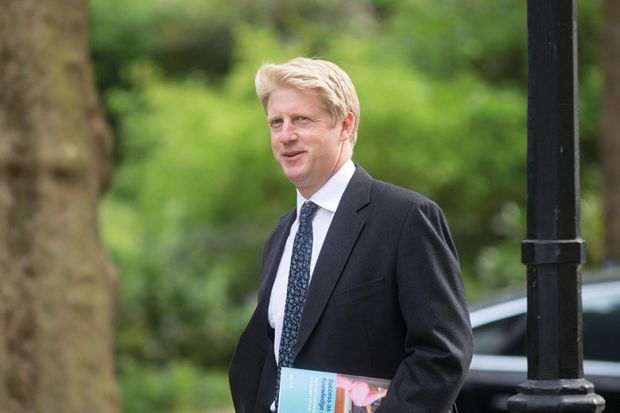The Augar review
Jo Johnson’s appointment sounds the death knell for the Augar review’s plans to cut tuition fees in England to £7,500 and shift replacement direct funding towards subjects with higher costs or greater “social and economic value”, according to many policy experts.
In his previous spell as minister, Mr Johnson fought tooth and nail against Theresa May’s plan to set up the review. He was subsequently moved from the Department for Education, and then continued his fight against the review from the back benches, arguing that the Treasury would never replace the lost fee income and the plans would cut university funding.
Rachel Wolf, a former adviser to Boris Johnson in his time as shadow higher education minister and a former education adviser in 10 Downing Street, said of the new prime minister: “By appointing Jo he has…clearly made an implicit decision that Augar – or at least the most challenging bits to HE – won’t be implemented.”
Rachel Hewitt, deputy director of the Higher Education Policy Institute, agreed that “Jo Johnson’s return seems to signify the review as a whole will not pass into practice”. Particularly unlikely to proceed were the “recommendations on lowering tuition fees and extending the [student loan] repayment period”, she added.
But Mr Johnson could nevertheless choose to run with some of the review’s recommendations on higher education funding, such as freezing the per-student resource until 2022-23, or bringing back maintenance loans, Ms Hewitt continued.
Ms Wolf, a founding partner at policy consultancy Public First, cautioned that “universities still need to be aware that they are at the centre of some big issues” occupying the Conservatives, “including free speech on campus, [unconditional] offers and degree class, and their wider contribution to society”.
Brexit
Ardently pro-Remain Mr Johnson resigned as transport minister in November 2018 to campaign for a second European Union referendum, warning that a no-deal Brexit would “inflict untold damage on our nation”.
Yet, some suggest, in order to serve in the Boris Johnson government, he has signed up to a pledge to take the UK out of the EU on 31 October, which appears likely to mean a no-deal Brexit. Mr Johnson’s position has brought claims that he “started with the highest principles and exchanged them for a job”.
Andy Westwood, professor of government practice at the University of Manchester, said that Mr Johnson is “on record saying how badly a no-deal will impact on research and universities, and he should be worrying about the new rhetoric offered by Boris and others. The sector and others won’t let him forget it.”
Could it be that Mr Johnson’s opposition to no-deal is the reason why he is in a junior minister’s post and not a Cabinet minister’s one? It would be less damaging to the government were he to resign from a junior minister’s post over no-deal, should that become imminent or an election manifesto commitment.
From a higher education and research policy perspective, the big Brexit issues include the UK’s continued involvement in the EU’s current research programme and Erasmus student mobility programme; and the government’s goal (or, at least, the previous government’s goal) of joining the successor programmes as associate members after Brexit.
A no-deal Brexit would reduce UK participation in the current programmes and probably kill off hopes of negotiating future association with the EU, as well as bring a host of immigration regime problems and broader deterrent factors that could hit EU student recruitment. But all this goes way beyond Mr Johnson’s brief.
Ms Hewitt said that his “hands are likely to be tied in terms of how much he can prevent the sector from harm, particularly given the line that his brother is currently taking”. But the sector “could have been left with a minister with a much less favourable background on Brexit”, and Mr Johnson’s “instincts are likely to be to minimise the damage” for higher education and research, she added.
International students
In his spell as a backbencher, Mr Johnson put forward an amendment to the immigration bill that would bring back post-study work visas, abolished by Ms May as home secretary. There were suggestions even before Boris Johnson became prime minister that the government would accept the amendment – the fact that the new prime minister had already signed it seems to offer further confirmation that it will lead to concrete results.
On overseas students, there will be a wider “softening of the government’s stance in the shift from May to Boris,” Professor Westwood said. Mr Johnson “will want to drive that home quickly, not least to gain some favour with the sector before Brexit arrangements get in the way”, he suggested.
Ms Wolf said: “While Boris wants to deliver Brexit, it’s pretty clear he is going to be friendly on high-skill immigration, which Dominic Cummings [the prime minister’s most senior adviser] is a huge proponent of at the top end. It’s plausible that will include students in some form.”
Boris Johnson has already dropped Ms May’s “tens of thousands” net migration target – so the motor driving her hostility to international student recruitment is no longer running.
Further moves that the sector would like to see would include a major government-backed marketing campaign to promote UK universities to potential students overseas, and perhaps a revival of ideas previously discussed between the sector and Whitehall about including access to UK student loans in future trade deals.
Teaching excellence framework
The rating system for English universities’ teaching was Mr Johnson’s creation, intended in his description to help drive “rapid market share shifts” between universities by enabling students to identify the “best” courses. He also wanted the TEF to evolve from a university-level evaluation to a subject-level one.
As a condition of letting Mr Johnson’s Higher Education and Research Act pass quickly before the 2017 general election, parliamentary opponents forced him into accepting an independent review of the TEF.
The review, led by former Loughborough University vice-chancellor Dame Shirley Pearce, is expected to reflect the sector’s intense concerns about a move to subject-level TEF.
With perfect timing, Mr Johnson is back in post to receive the results of that review. Shortly after his return, the DfE said that the review had been delayed until the autumn.
Gordon Marsden, Labour’s shadow higher education minister, said: “It is just as well he [Mr Johnson] does know the ropes because there are plenty of them he needs to climb fairly rapidly, including one or two he put in place himself.”
Mr Marsden said “all the signs” suggested that subject-level TEF was “going to be completely unworkable and very expensive. So we look to see what he’s going to say about TEF.”
Professor Westwood predicted that the “TEF agenda is likely to be reinforced and given some extra welly” because Mr Johnson would show a “more stubborn belief” in it “as a system and policy” in the face of criticism from the sector and potentially from Dame Shirley’s review.
New providers and vocational education
Mr Johnson’s vision for higher education, as expressed in the Higher Education and Research Act, was to make the sector function as a competitive market in order to drive better outcomes for consumers/students.
To this end, he wanted to encourage new and for-profit providers to compete with universities by pressuring them to be more innovative.
To foster the new market, Mr Johnson created a market/consumer regulator for the English sector: the Office for Students.
In his absence, the OfS has taken on its regulatory powers – and been far tougher on concerns about quality and dropout rates at for-profit providers than the DfE ever was when it regulated them.
The OfS has been getting tough with new providers that are of a different kind to those supported in public by Mr Johnson (innovative, niche providers).
But for Mr Marsden, the OfS’ tougher stance “undermines the whole market-oriented way Jo thought the system was going to go forward”. The Labour MP added: “Is [Mr Johnson] going to respect the decisions of the OfS and say that he was wrong? Or is he going to plough on with this market view?”
Could, however, the shift in political mood in the Brexit era have moved the ground away from marketisation? Professor Westwood stressed that the new government will devote more attention to Level 4 and 5 vocational education and to further education, which many see as reflecting the Tories’ new need to court working-class Leave voters. Gavin Williamson, the new education secretary, is to lead on further education and skills.
“If Williamson has any sense, he’ll make sure that Jo’s brief is across all of higher education [including vocational education] rather than just universities,” said Professor Westwood.
The need to prioritise vocational education is “likely to overtake Jo’s previous interest in competition, new providers, [and] consumers that characterised his previous term”, he added.
POSTSCRIPT:
Print headline: Five urgent priorities for Jo Johnson
Register to continue
Why register?
- Registration is free and only takes a moment
- Once registered, you can read 3 articles a month
- Sign up for our newsletter
Subscribe
Or subscribe for unlimited access to:
- Unlimited access to news, views, insights & reviews
- Digital editions
- Digital access to THE’s university and college rankings analysis
Already registered or a current subscriber?







